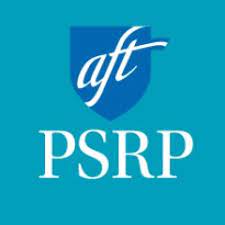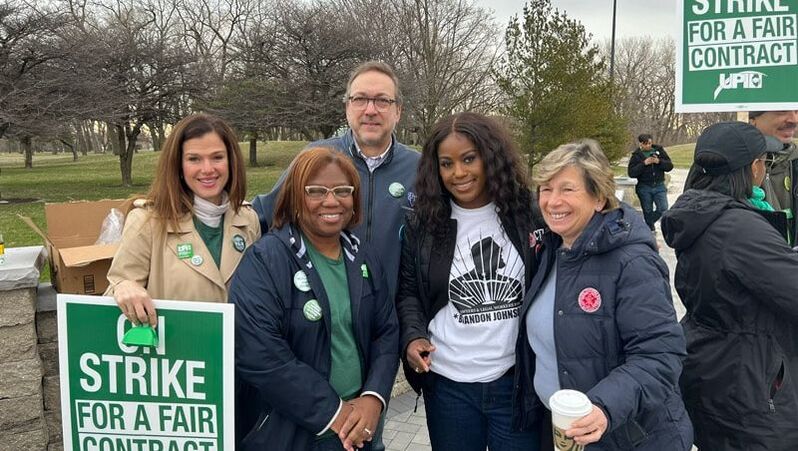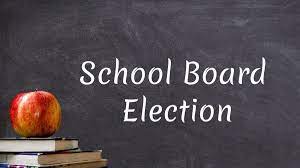 Strike at Governor's State with AFT Secretary-Treasurer Fed Ingram Strike at Governor's State with AFT Secretary-Treasurer Fed Ingram As I end my final term as President of the Teacher’s Council for Local 434, I have been reflecting on unionism and what it means to be part of a union. During my 20 years in 434 leadership, I have seen myself become more and more active in the larger labor movement, and I am currently serving as the President of the Southwest Area Council and the Secretary Treasurer of the Illinois Federation of Teachers. I see now that my work is not over, it has only just begun in many ways. So what does it mean to be a part of the union? It means we have the strength of many behind us. It means we have job security and a safe place to work. It means we have some say in determining our evaluations, our mentoring program, our sick leave, our rights as professionals. It means we have a contract to protect us. It also means we are part of something larger than ourselves. We are all proud members of the Belleville Federation of Teachers, but we are also members of the 6,000 strong Southwest Area Council, a labor council dedicated to preserving and uplifting the voices of our region. We are members of the 100,000 strong Illinois Federation of Teachers, and we are also part of the over 1.2 million strong American Federation of Teachers. There is strength in numbers. More importantly, we are part of a growing labor movement. This movement is nationwide, from Starbucks, Trader Joe’s and Amazon workers, to undergraduate students throughout the nation. The National Labor Relations Board saw a 53% increase in union representations filed from last year. A Gallup poll published last August found that 71% of Americans approve of labor unions (that number increases to 77% for young adults aged 18-34). This is the highest approval rating since 1965. Americans are noticing that when we fight, we win. In fact, here in Illinois there were three higher institutions on strike at the same time in April, and all three secured solid contracts. There is even a former middle school social studies teacher, also a proud member of the IFT, who was recently sworn in as mayor of Chicago. Change is upon us! None of this surprises me. It sometimes takes a catastrophic event to foment real change. It was the Black Death in the 14th century where an estimated 30-50% of the population died that brought an end to feudalism. Workers were scarce, and they were able to successfully demand wages for their work. We recently lived through a global pandemic. Of course significant change has come out of it. Unions have not only survived the pandemic; we have thrived as a result of it. We see now that union representation at all levels has strong advantages. We can bargain for protections and safety. We can bargain for wages and working conditions. We can be a part of something larger and more powerful than what we could accomplish on our own. “Yet what force on earth is weaker than the feeble strength of one For the Union makes us strong.” So what does this mean for you? This means we all should take pride, and more importantly stewardship of this union. Local 434 is YOUR UNION. We have been active and engaged for 87 years, and now it's your time to step up, get involved, and contribute to the movement. In the words of Solidarity Forever written in 1915 by Ralph Chaplin: In our hands is placed a power greater than their hoarded gold Greater than the might of atoms, magnified a thousand fold We can bring to birth a new world from the ashes of the old For the Union makes us strong Solidarity Forever Solidarity Forever Solidarity Forever For the Union makes us strong. Solidarity Forever my union siblings! It has been a pleasure and an honor to have served you in this capacity, Cyndi Oberle-Dahm “There can be no power greater anywhere beneath the sun,  Administrative Assistants' Council President Liz de la Torre attended the PSRP conference in April. "For the PSRP Conference, my main takeaway was that all educators, no matter if they are Administrative Assistants, lunch workers, or bus drivers deserve respect. Respect does not only come in the form of a living wage, but it also should come from supervisors and coworkers. One of the workshops on the topic demonstrated how supervisors and coworkers can disrespect PSRPs and others through unconscious bias and steps PSRPs can take to positively indicate these biases through assertiveness. " In April members attended the Southwest Area Council meeting and collaborated with other educator from Southern Illinois. Here's what they had to say:
Thomas Gallaher: "This was a great opportunity to meet with other leaders from Southern Illinois. It is a good reminder that we are not isolated in our problems, but that we are also not isolated in striving for change. SWAC is an important tool in giving us power through networking to offset some of the power that is concentrated in Chicago." Kelly Schlueter: Getting together with other IFT members and having good discussions is one of the best things about meeting. Tiffany Stellhorn: We concentrated on successes within our union. I got to bounce ideas off of people from other unions with experience in the issue for contract change. Members from all 3 councils and all three campuses spent the March 24 Wellness Day participating in the IFT Trauma Informed Training Session. Here were some key takeaways:
Kara Schnoeker: On March 24th during the teacher institute, I was fortunate enough to attend the Trauma-Informed Teaching Training Session with colleagues and friends. It is hard to put into words how useful and enlightening the training was. Those of us who attended training were able to collaborate with each other on how to best support our students, our colleagues, and ourselves emotionally. We had really amazing and productive conversations as a whole group and in small groups. I felt like we accomplished so much in such a short period of time, and it sparked some much-needed conversations and assessments on how we respond to different scenarios in the classroom. It is amazing to me how so many of us shared similar thoughts and feelings, but had never discussed them in a group setting. This training was a wonderful experience, and I am very happy that I made the decision to attend. Tiffany Stellhorn: 1) I experienced an in-depth hour-long training on how to do a restorative circle. Even though I’ve experienced restorative circles within my classroom, with assistant principals and parents, this training strengthened my ability to create a conducive learning environment. I don’t have a fear or nervousness about the Advisory period next year. 2) Throughout the day, we went into depth of our strengths as a district and our challenges as a district. We realize that only half our staff will read about our experience (and that’s optimistic). We have this Advisory Period next year where we have no idea where/what to expect. However, at this training, we connected as colleagues. I gained friendships and trust with others I never would’ve done on my own. It re-filled my “cup. 3) The overarching goal I feel now is how can we as a union help each other. Towards the end of the day, we were left with the “Now what?” Those of us in the training created a Google Chat/Space to start sharing ideas of how we continue. Next step so far is to attend the DEI (Diversity, Equity and Inclusion) Summit on June 8th. Members attended this professional development in January. Here are some of their key takeaways:
Jeff West: "We learned how to begin and sustain union engagement at the local level. Participants also were given an opportunity to meet other active members in other local teachers' unions." Chelsea Kilzer: "I learned how I can be more involved in the protection of my rights as a public educator while also making sure that every student has access to FAPE." Tiffany Stellhorn: "When we want change, we need numbers backing the idea. In order to get the numbers, we need to track involvement. We gained ideas on how to ensure information gets out to the membership and how to have difficult conversations with each other about changes individuals want for the upcoming contract." Each odd-numbered year in April, District 201 holds an election for school board members. This year is an uncontested election, with only one new person on the ballot. Professional Issues Chair Jessica Templin reached out to all individuals on the ballot and offered an opportunity for them to submit a short biography about themselves for our District 201 staff to get to know them. Continue reading to learn more about some of our school board members!
Bio from Mrs. Casey Fares, running uncontested: My name is Casey Fares. I moved to the Belleville area in 2004 from Oklahoma. I was active duty Air Force for 4 years and an active Air Force reservist for an additional 4 years. By trade, I am a dental hygienist. Upon my military discharge, my husband and I decided to stay in the local area to raise our family. We have four beautiful, busy, boys. We currently have a freshman at Belleville East, while our others attend Whiteside Elementary. We are proud to call this area home. We are very active within our community and love spending time supporting local businesses. I am completely invested in the education and community that my children grow and learn in. I ultimately want to support the board and schools from a parent’s point of view. I genuinely care about the educators and children that we support in our community. I want the best for my children’s friends, parents, teachers, supporters, teammates, and stakeholders. I feel having a strong foundation to support our students is imperative and shouldn’t be taken lightly. I would love the opportunity to give an insight on my opinions and experiences. This will be a new journey for me, and I’m excited to help in any way. I look forward to working with everyone and developing meaningful relationships within the committee and board. Bio from incumbent Ms. Nicki J. Brown, MBA - MPH My husband, Ruben and I moved to Belleville in 2003 for my career with Pfizer after both, proudly serving in the United States Air Force. In 2005 our daughter, Brooklynne was born, and we quickly realized Belleville would be our families forever home. I have always been enthusiastic about giving back and making a difference in the community, locally and/or globally throughout my life. When Brooklynne started school my volunteer work focused on her school. I became room mom, Girl Scout Leader, Parent Teacher Committee member/officer, booster club and whatever the event or give back of the month was. It all became clearer to me, I knew what my mom meant when she said, it takes it a village to raise a child; it truly does. From the very first day of kindergarten, to her high school graduation this May, it has been inspiring and I am in awe of her growth, and the amazing young lady she is becoming. Her educational achievements, personal and emotional growth and future opportunities are not due to just my husband and I; it is because of all the educators, coaches, staff and administrators that invested in her, spent the extra hours preparing, encouraging, and recognizing something in her that maybe we as parents didn’t see, or she didn’t see in herself. Therefore, I am running to be re-elected to Belleville Township District 201 school board because I want to continue to be a part of, serve, support, and give back to the students, educators, staff, administrators, and community: with the goal of continued and elevated educational excellence. My military service, professional education and vast experiences allow for me to bring unique business acumen, diversity equity lens, and the passion and purpose to serve all the district 201 community. Employment, Education, and Community Service · Pfizer Inc. 2001 – Present/ Area Business Director (MO/IL/IN/KY/TN) Health Systems & Rare Disease Marketing · Post Graduate Certificate Key Account Management & Health Care Administration – International Studies, University of Dublin, Ireland – December 2022 · Certificate Cultural Competency, December 2020 · School Board member Belleville Township District 201, August 2021 – Present · Chair for School District 201 parent group, CARE - Community Advocating Racial Equity, 2020 – 2022 · Whiteside School District PTC/Booster Club multiple roles responsibilities (President, Secretary, Treasurer), 2011 – 2019 · Girl Scout Leader Whiteside School, 2011 - 2017 · DEI (diversity/equity/inclusion) certified instructor, Pfizer Inc. 2009- present · MBA & MPH, Saint Leo University, St. Leo, FL – June 2010 / B.A. in Human Resources Management, St. Leo University, St. Leo, FL – May 1996 · AAS, Financial Management, Community College of The Air Force, Maxwell AFB, AL. – December 1998 · Active-Duty Air Force, Financial Services, 1992 - 2000 Bio from incumbent Mr. Mike Eiskant My name is Mike Eiskant and I am current school board member of BTHS District 201. I am a long-time resident of Belleville and Millstadt, own multiple businesses (Fletcher’s Kitchen & Tap) and former graduate of Dist. 201. I am a married, father of two who is dedicated to making our community a better place for future generations. My wife is a current educator, as well as other close family members. Outside of numerous community support activities via both personally and through my businesses, I have two children attending Belleville West and enjoy supporting them with school activities, including student council, sports, National Honors Society, and leadership building groups. I have been a BTHS Dist. 201 board member for the previous 8 years and am seeking re-election during the upcoming April 2023 election cycle. My service on the school board has been very rewarding, despite the challenges of the pandemic. While the most recent 2 years have provided the educational setting hurdles not seen in this lifetime, the school board has worked hand and glove with the BTHS Dist.201 administration team to bring forth the best and safest options to keep children learning. Continuing the great strides BTHS Dist. 201 has made is a priority of mine and would like the opportunity to build off some of the highlights below: - Financial stability of the entire district. - Continued tax rate decreases. - Opening of the C.A.V.E to provide state of the art access to vocational education garnering state and national attention. - Responsible improvements of all facilities under the district control: Building & roofing upgrades, performing arts center upgrades, gymnasium and athletic field improvements. - Introduction of new courses and clubs to provide unfettered access for all students and remove barriers to participation. By L. Spriggs
Unions don’t generally support doing unpaid work for employers because it sets the precedent that employees have an obligation to work for their employer on their time off, and that should be unacceptable to anyone who supports unions. Your employer isn’t entitled to your unpaid personal time. It gets tricky, however, for teachers. One reason is because many people see themselves as working extra for their students, not for their employer, and this leads to them volunteering their time to tutor, to sponsor unpaid clubs, to attend school events, to provide plenty of feedback through grading on their weekends, etc. Volunteering your time for your students outside of the contractually obligated workday is a personal choice that the union leaves up to its members. However, keep in mind that our contract does state that, "As professionals, teachers recognize their obligation to be available often for students and others before and/or after school hours." That's pretty vague, so I interpret that to mean that we should be willing to take or make phone calls when necessary, to occasionally come in early or stay late to meet with parents or students when needed, and to generally make sure we're available at some point for co-workers, students, parents, or administrators if the need arises and the requests are reasonable. The most common concern, especially for new teachers, is whether or not it’s O.K. To roll into the parking lot with just enough time to make it to your desk or office in the morning, or whether it’s O.K. To bust out right at the bell in the afternoon, and how they might be judged by others for doing so. From a union perspective, it’s not your obligation to justify your arrival and departure times for the administration, for parents, or for your fellow co-workers—as long as you’re here when you’re supposed to be and need to be. Some of us arrive early, so we leave early; some of us stay late so we arrive just on time; many of us take work home, have kids to drop off or pick up, appointments to get to, shopping to do, etc. Sometimes you just have a rough day and need to get the hell out of the building as soon as possible, and some of us just like to spend as little time at work as possible just because it’s work. As long as you're fulfilling your duties, there are no extra prizes for coming in early or staying late, and no extra penalties for walking in with the students or leaving with the students. Finally, don’t forget that some of us see teaching as a calling, and some of us see it as just a job, and as long as you’re doing the job well and you’re adhering to the contract, both of those views are equally acceptable from a union’s perspective. There’s already a teacher shortage in America. If we waited around to hire only teachers who felt called to teaching, our class sizes would be a heck of a lot bigger. By L. Spriggs
Employers are notoriously famous for mismanaging workplaces, especially when it comes to discipline. This mismanagement generally works in favor of union members since employees can't be punished for breaking a rule or violating a standard if the employer hasn't been enforcing that rule or standard for a prolonged period. When employers fail to enforce a rule or policy for any considerable length of time, the assumption is that the employer no longer expects its employees to follow that rule or policy. After all, isn't that the message they're sending by not disciplining employees? Arbitrators tend to agree, and they refer to such inaction as "lax enforcement." In order to prove lax enforcement when defending members, however, unions must provide proof that a rule or policy was violated, and that management either knew—or should have known—about the violation but failed to enforce the rule or policy. For example, the union could provide testimony from an employee who previously broke the same rule or policy in front of management but was never punished. Proving lax enforcement, however, runs the risk of what's called a "reset" by the employer, in which case an employer notifies employees of the existing rule or policy, explains how they failed to enforce the rule or policy in the past, and describes their plan to strictly enforce the rule or policy in the future. Once an employer has taken these steps, they're free to punish future violations as long as punishment remain consistent. But we know that management is rarely ever consistent... ;) By T. GallaherAs more national, state, and local political issues impact our classrooms, it is important to understand how and why unions engage in political advocacy on behalf of their members. Let’s start with why. Political advocacy is an essential role that unions play in order to influence policy, elections, and working conditions that impact us all. Ultimately, we do not have the power to make decisions at the state and local level, but we do have the power to influence those decisions and make sure that our voices are heard. Acting as a collective ensures that we are a part of the process.
In terms of how education unions engage in political advocacy, there are a variety of methods such as forming Political Action Committees (PACs), lobbying lawmakers, endorsing candidates, and providing oversight. PACs have been around since the 1940s, and describe organizations whose purpose is to raise and spend money to influence elections or legislation. Along with raising money to support candidates, unions also give organizational endorsements to certain candidates that share our values and priorities. Lobbying is any activity which seeks to influence government decision making. Education unions, like many organizations, lobby lawmakers in order to preserve our collective bargaining rights, workplace safety, and the overall educational environment we seek to promote. Generally, lobbying involves forming relationships with lawmakers and providing them with information and perspective from those in education. Finally, unions play a role in providing oversight for the government by ensuring that our rights are guaranteed and acting as a check on policy makers. By L. Spriggs Your employer can't discipline you for violating a rule or standard if they don't have substantial and credible evidence to justify the discipline. In his book titled Just Cause: A Union Guide to Winning Discipline Cases, Robert M. Schwartz recounts an interesting case where "an employee...called in sick with an intestinal disorder. Learning that she traveled to an out-of-state casino, the company fired her for dishonesty." In this case, the employee actually admitted to taking the trip but claimed to have been sick the entire time. Since the company didn't have any evidence that she could have worked, the arbitrator ruled in her favor and ordered that she be reinstated. Apparently, union members can go to the casino or a Cardinal's game when they call in sick as long as they actually look sick in all of the photos they post on social media... But seriously, don't do that. Generally, arbitrators rely on predetermined standards of evidence when evaluating grievances under the substantial evidence standard. These standards are not as robust as legal standards of evidence, but they still help to protect union members from being suspended or dismissed for unjust reasons. Furthermore, evidence that employers present, whether direct evidence, circumstantial evidence, or hearsay, can often be successfully disputed by a union depending on the circumstances of the situation. "Your employer can't discipline you for violating a rule or standard if they don't have substantial and credible evidence to justify the discipline." Imagine, just imagine, a student accuses a teacher of grabbing them in the hallway and the parents call threatening to get lawyers involved, so the administration decides to investigate and they determine the evidence to be significant enough to discipline the teacher. However, the teacher claims she was reaching for a pass that she had asked the student to show her. Now, let's also imagine, just imagine, that upon closer examination of the evidence, the camera footage capturing the incident is unclear and could be interpreted as footage of the teacher simply reaching toward the student instead of grabbing them. On top of that, the eyewitness accounts from another union member, as well as two other students, contradict the student's own claims.
In such a case, if the administration still moved forward with suspension or dismissal and the case eventually went to arbitration, the evidence presented by the administration would not meet the standard of substantial evidence. |
Categories
All
Archives
May 2023
Editor:
Proud alumnus, union member, and educator in District #201 since 2006. Contributors
Dr. Hentze is the author of High Finance with Hentze, a monthly blog that provides news about District 201's current financial state. |







 RSS Feed
RSS Feed